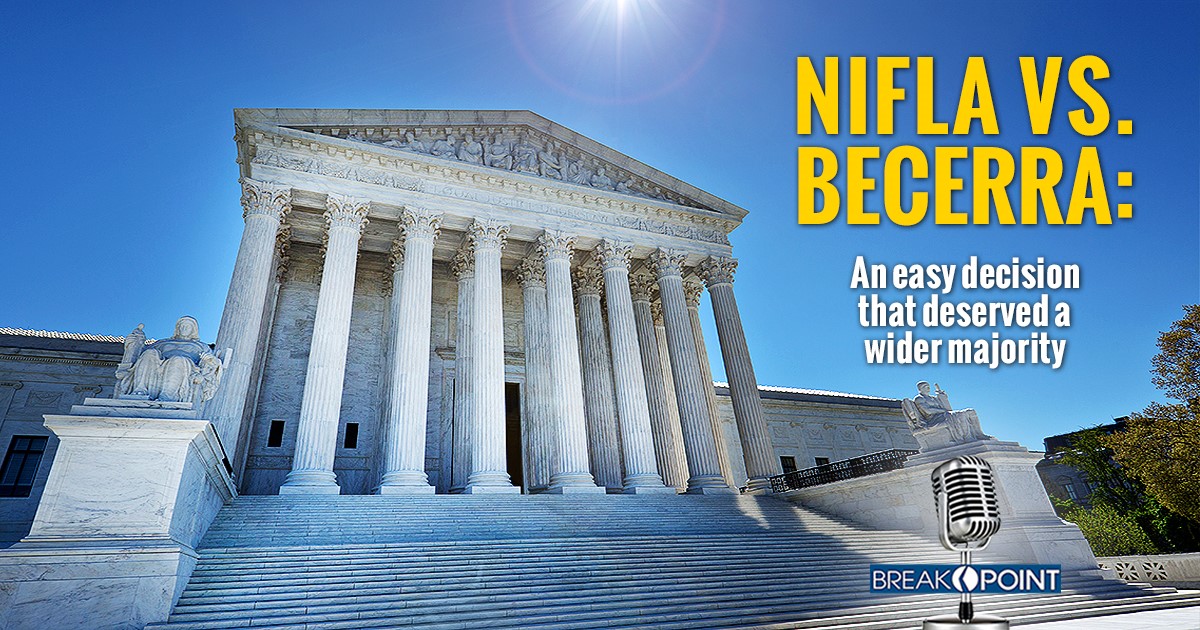

BreakPoint
BreakPoint: NIFLA vs. Becerra
 Based on oral arguments, yesterday’s Supreme Court decision was expected. But what was surprising, and a little disconcerting, was how close it was.
Yesterday, by a 5-4 vote, the Supreme Court ruled that a California law that would have required pregnancy care centers to promote abortion violated the First Amendment’s guarantee of free speech.
The case is called National Institute of Family and Life Advocates vs. Becerra, and it involved a California law called the Reproductive Freedom, Accountability, Comprehensive Care, and Transparency Act.
The law required pregnancy centers to disseminate a notice to women coming to them for help that California had programs that could provide them immediate free or low-cost access to abortion. The law even stipulated the size of the notice and the size of the font that must be used on the notice: 48 point type!
The law was blatantly discriminatory and obviously a violation of free speech. Nevertheless, it was the law in California, and it was upheld by the Ninth Circuit, and then appealed to the U. S. Supreme Court.
At oral argument, California met, in the words of the New York Times, a “skeptical reception.” Most of the justices agreed with Alliance Defending Freedom CEO and General Counsel Michael Farris when he said that the law specifically targeted “disfavored speakers,” those whose message it disagrees with.
Thus it was no surprise when NIFLA and ADF prevailed at the Supreme Court yesterday. Writing for the majority, Justice Thomas called the required notice a “content-based regulation of speech,” something the Constitution views with “great suspicion.”
Thomas rejected California’s argument that the required notice was analogous to “informed consent” laws that apply to abortion providers. He wrote that “The notice does not facilitate informed consent to a medical procedure. In fact, it is not tied to a procedure at all.”
Similarly, California's professed goal “to educate low-income women about the services it provides,” didn’t pass muster either. As Thomas put it, if that was really the goal, the required notice was “wildly under-inclusive.”
But still, I’m surprised the conservative majority wasn’t joined by at least one or two of the more liberal justices. During oral arguments, Justice Kagan compared the law to “gerrymandering” and added this “would be a serious First Amendment problem.” And yet, she joined the minority in arguing that there was no constitutionally-meaningful difference between the California law and informed consent laws.
So, what’s next? The Supreme Court sent the case back to the lower court with instructions that ensures that the law will never take effect. This ruling also resolves similar cases in Maryland, Illinois, Hawaii and other states. So pregnancy care centers are free to continue their important work without fear that the government will force them, in Justice Thomas’ words, to “drown out” their message.
And let me add my kudos to the Alliance Defending Freedom. The Southern Poverty Law Center may consider them to be a “hate group,” but after two straight victories at the Supreme Court, the correct designation would be “winner."
NIFLA vs. Becerra: An Easy Decision That Deserved a Wider Majority
Praise God for the decision in the NIFLA case. It is an encouraging one, although as Warren mentioned, the majority should have been bigger. Find out more about the details of this case and the Supreme Court's opinions. Click on the links in our Resources section.
Based on oral arguments, yesterday’s Supreme Court decision was expected. But what was surprising, and a little disconcerting, was how close it was.
Yesterday, by a 5-4 vote, the Supreme Court ruled that a California law that would have required pregnancy care centers to promote abortion violated the First Amendment’s guarantee of free speech.
The case is called National Institute of Family and Life Advocates vs. Becerra, and it involved a California law called the Reproductive Freedom, Accountability, Comprehensive Care, and Transparency Act.
The law required pregnancy centers to disseminate a notice to women coming to them for help that California had programs that could provide them immediate free or low-cost access to abortion. The law even stipulated the size of the notice and the size of the font that must be used on the notice: 48 point type!
The law was blatantly discriminatory and obviously a violation of free speech. Nevertheless, it was the law in California, and it was upheld by the Ninth Circuit, and then appealed to the U. S. Supreme Court.
At oral argument, California met, in the words of the New York Times, a “skeptical reception.” Most of the justices agreed with Alliance Defending Freedom CEO and General Counsel Michael Farris when he said that the law specifically targeted “disfavored speakers,” those whose message it disagrees with.
Thus it was no surprise when NIFLA and ADF prevailed at the Supreme Court yesterday. Writing for the majority, Justice Thomas called the required notice a “content-based regulation of speech,” something the Constitution views with “great suspicion.”
Thomas rejected California’s argument that the required notice was analogous to “informed consent” laws that apply to abortion providers. He wrote that “The notice does not facilitate informed consent to a medical procedure. In fact, it is not tied to a procedure at all.”
Similarly, California's professed goal “to educate low-income women about the services it provides,” didn’t pass muster either. As Thomas put it, if that was really the goal, the required notice was “wildly under-inclusive.”
But still, I’m surprised the conservative majority wasn’t joined by at least one or two of the more liberal justices. During oral arguments, Justice Kagan compared the law to “gerrymandering” and added this “would be a serious First Amendment problem.” And yet, she joined the minority in arguing that there was no constitutionally-meaningful difference between the California law and informed consent laws.
So, what’s next? The Supreme Court sent the case back to the lower court with instructions that ensures that the law will never take effect. This ruling also resolves similar cases in Maryland, Illinois, Hawaii and other states. So pregnancy care centers are free to continue their important work without fear that the government will force them, in Justice Thomas’ words, to “drown out” their message.
And let me add my kudos to the Alliance Defending Freedom. The Southern Poverty Law Center may consider them to be a “hate group,” but after two straight victories at the Supreme Court, the correct designation would be “winner."
NIFLA vs. Becerra: An Easy Decision That Deserved a Wider Majority
Praise God for the decision in the NIFLA case. It is an encouraging one, although as Warren mentioned, the majority should have been bigger. Find out more about the details of this case and the Supreme Court's opinions. Click on the links in our Resources section.
06/27/18















